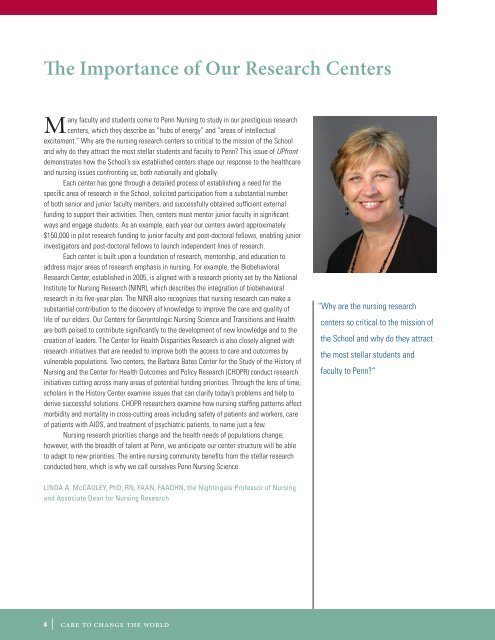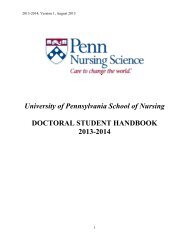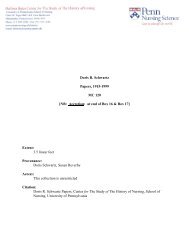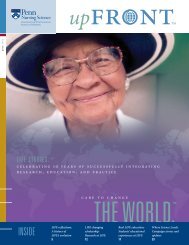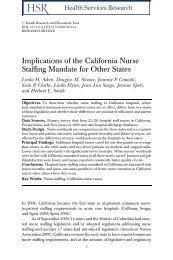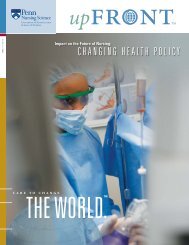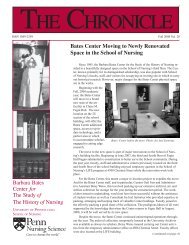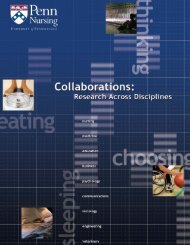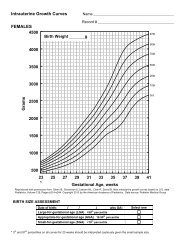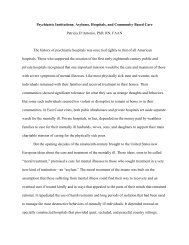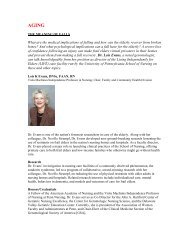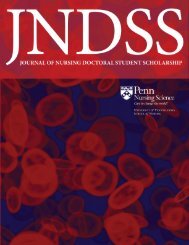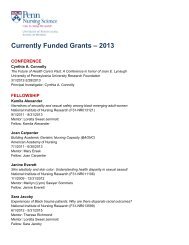Research Centers - University of Pennsylvania School of Nursing
Research Centers - University of Pennsylvania School of Nursing
Research Centers - University of Pennsylvania School of Nursing
Create successful ePaper yourself
Turn your PDF publications into a flip-book with our unique Google optimized e-Paper software.
The Importance <strong>of</strong> Our <strong>Research</strong> <strong>Centers</strong><br />
Many faculty and students come to Penn <strong>Nursing</strong> to study in our prestigious research<br />
centers, which they describe as “hubs <strong>of</strong> energy” and “areas <strong>of</strong> intellectual<br />
excitement.” Why are the nursing research centers so critical to the mission <strong>of</strong> the <strong>School</strong><br />
and why do they attract the most stellar students and faculty to Penn? This issue <strong>of</strong> UPfront<br />
demonstrates how the <strong>School</strong>’s six established centers shape our response to the healthcare<br />
and nursing issues confronting us, both nationally and globally.<br />
Each center has gone through a detailed process <strong>of</strong> establishing a need for the<br />
specific area <strong>of</strong> research in the <strong>School</strong>, solicited participation from a substantial number<br />
<strong>of</strong> both senior and junior faculty members, and successfully obtained sufficient external<br />
funding to support their activities. Then, centers must mentor junior faculty in significant<br />
ways and engage students. As an example, each year our centers award approximately<br />
$150,000 in pilot research funding to junior faculty and post-doctoral fellows, enabling junior<br />
investigators and post-doctoral fellows to launch independent lines <strong>of</strong> research.<br />
Each center is built upon a foundation <strong>of</strong> research, mentorship, and education to<br />
address major areas <strong>of</strong> research emphasis in nursing. For example, the Biobehavioral<br />
<strong>Research</strong> Center, established in 2005, is aligned with a research priority set by the National<br />
Institute for <strong>Nursing</strong> <strong>Research</strong> (NINR), which describes the integration <strong>of</strong> biobehavioral<br />
research in its five-year plan. The NINR also recognizes that nursing research can make a<br />
substantial contribution to the discovery <strong>of</strong> knowledge to improve the care and quality <strong>of</strong><br />
life <strong>of</strong> our elders. Our <strong>Centers</strong> for Gerontologic <strong>Nursing</strong> Science and Transitions and Health<br />
are both poised to contribute significantly to the development <strong>of</strong> new knowledge and to the<br />
creation <strong>of</strong> leaders. The Center for Health Disparities <strong>Research</strong> is also closely aligned with<br />
research initiatives that are needed to improve both the access to care and outcomes by<br />
vulnerable populations. Two centers, the Barbara Bates Center for the Study <strong>of</strong> the History <strong>of</strong><br />
<strong>Nursing</strong> and the Center for Health Outcomes and Policy <strong>Research</strong> (CHOPR) conduct research<br />
initiatives cutting across many areas <strong>of</strong> potential funding priorities. Through the lens <strong>of</strong> time,<br />
scholars in the History Center examine issues that can clarify today’s problems and help to<br />
derive successful solutions. CHOPR researchers examine how nursing staffing patterns affect<br />
morbidity and mortality in cross-cutting areas including safety <strong>of</strong> patients and workers, care<br />
<strong>of</strong> patients with AIDS, and treatment <strong>of</strong> psychiatric patients, to name just a few.<br />
<strong>Nursing</strong> research priorities change and the health needs <strong>of</strong> populations change;<br />
however, with the breadth <strong>of</strong> talent at Penn, we anticipate our center structure will be able<br />
to adapt to new priorities. The entire nursing community benefits from the stellar research<br />
conducted here, which is why we call ourselves Penn <strong>Nursing</strong> Science.<br />
“Why are the nursing research<br />
centers so critical to the mission <strong>of</strong><br />
the <strong>School</strong> and why do they attract<br />
the most stellar students and<br />
faculty to Penn?”<br />
LINDA A. McCAULEY, PhD, RN, FAAN, FAAOHN, the Nightingale Pr<strong>of</strong>essor <strong>of</strong> <strong>Nursing</strong><br />
and Associate Dean for <strong>Nursing</strong> <strong>Research</strong><br />
4 | care to change the world


